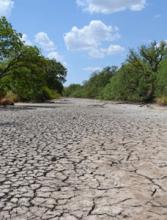Climate and Health: Drought and Your Health
Ongoing drought conditions can place a strain on human health. Drought conditions may lead to food insecurity resulting from crop failures or market demands driving up food costs, and respiratory distress from dust, pollen, and other airborne particles. Drought can potentially threaten drinking water quality and quantity for all water users. Residents depending on groundwater for drinking water may notice water with different tastes or odors due to changes in water chemistry, and may be at risk for consuming heavy metals, organics, and other groundwater contaminants.
Similar to the impacts of heat extremes, drought can negatively affect agriculture through crop failures, livestock water shortages, and the resulting economic losses to farmers, food processors, and the trucking industry. Drought conditions will also place a stronger demand on groundwater resources, as farmers look to irrigate valuable crops.
There is also a strong correlation between drought conditions and the occurrence of wildfires, which are associated with injury or death, eye irritation, and exacerbation of asthma and other respiratory diseases.
The following table shows health related concerns regarding drought and what actions should be taken during drought times.
| Concern | Signs and Symptoms | Solutions |
|---|---|---|
| Extreme Heat |
|
|
| Diminished Food Supply |
|
|
| Poor Air Quality |
|
|
| Limited Water Supply |
|
|
| Mental Health |
| Consult with a mental health provider and/or your doctor |
Department of Health Services resources
- Heat-Related Health and Safety Tips
- Wisconsin Drought Toolkit, P-00884 (PDF)
- Information on water issues related to drought
Wisconsin resources
- ReadyWisconsin drought resources
- Wisconsin DNR (Department of Natural Resources) drought resources
- Wisconsin DNR 'What's wrong with my water'?
- Wisconsin DATCP (Department of Agriculture, Trade and Consumer Protection) drought resources
Other resources
- U.S. Drought Monitor map of Wisconsin
- Prepare for a drought: Information from the Environmental Protection Agency
- Crisis support for farmers and their families: Information and resources from Farm Aid
- Mental health resources for farmers: Information and resources from the National Alliance on Mental Illness

